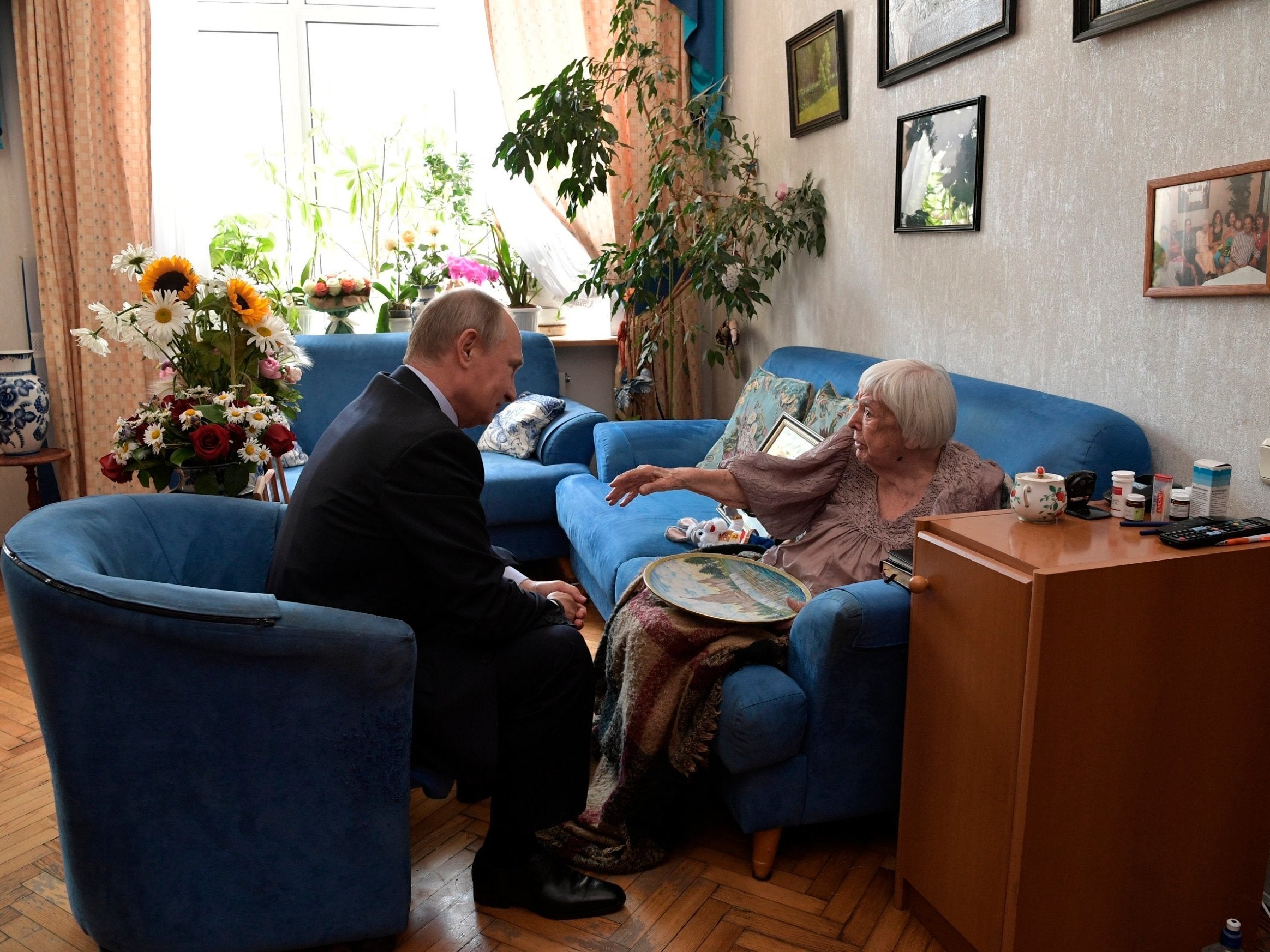Lyudmila Alexeyeva: Russian human rights activist dies, aged 91
She had been exiled from Russia during the Soviet Union, and worked her whole life to improve human rights

Your support helps us to tell the story
From reproductive rights to climate change to Big Tech, The Independent is on the ground when the story is developing. Whether it's investigating the financials of Elon Musk's pro-Trump PAC or producing our latest documentary, 'The A Word', which shines a light on the American women fighting for reproductive rights, we know how important it is to parse out the facts from the messaging.
At such a critical moment in US history, we need reporters on the ground. Your donation allows us to keep sending journalists to speak to both sides of the story.
The Independent is trusted by Americans across the entire political spectrum. And unlike many other quality news outlets, we choose not to lock Americans out of our reporting and analysis with paywalls. We believe quality journalism should be available to everyone, paid for by those who can afford it.
Your support makes all the difference.Lyudmila Alexeyeva, one of Russia’s most prominent and decorated human rights activists has died aged 91.
In the 1960s and 70s, Alexeyeva protested for the release of political prisoners in the Soviet Union and most notably, she co-founded Russia’s oldest human rights group, the Moscow Helsinki Group (MHG), in 1976. She remained an activist “to the very end”, said Mikhail Fedotov, head of Russia’s Human Rights Council. “This is a loss for the entire human rights movement in Russia.”
Ms Alexeyeva had been battling a long illness, and doctors revived her several times before her death on Saturday, according to France24, She is survived by her two sons, five grandchildren and three great grandchildren.
Vladimir Putin had an inconsistent relationship with Ms Alexeyeva. At one point, he appointed her to an advisory council, although she remained critical of his war in Chechnya. She convinced him to halt plans to evict thousands of Chechen refugees from camps and to withdraw a bill that would have greatly expanded the definition of treason. On her 90th birthday, he even visited her and brought her champagne.
But suspicion of rights groups under Mr Putin’s rule increasingly impeded her efforts. Government officials later accused nongovernment organisations like MHG of spying on Russia for the west, and Alexeyeva became the target of death threats by nationalist groups. Still, she remained determined and optimistic, maintaining her ties to the Kremlin.
“I don’t accuse, I explain,” she said. “I say, ‘You don’t agree? We will speak some more.”’
Ms Alexeyeva wrote previously in the Washington Post that a Russian law had branded her organisation a “foreign agent”, which made it difficult for it to accept foreign donations. In 2014, the Moscow Helsinki Group laid off and cut pay for much of its staff, limiting its ability to affect change. Members of the Moscow Helsinki Group have been arrested, jailed, and forced into exile.
Ms Alexeyeva was herself forced into exile under threat of arrest in 1977. She moved to the US and did not return to Russia until 1993, after the Soviet Union had collapsed.
Born in Crimea on 20 July 1927, Alexeyeva studied archaeology at Moscow State University. She was drawn into the dissident movement during the Khrushchev thaw, the period of relaxed censorship under Soviet leader Nikita Khrushchev in the 1950s and early 1960s.
She was part of the small but determined circle of Moscow dissidents that included Sergei Kovalyov, a biologist who survived a gulag labour camp, and physicist Andrei Sakharov, who won the 1985 Nobel Peace Prize. The dissidents often met but seldom talked about their illegal political activities, working in secret cells to deter arrests.
In the early 1970s, Alexeyeva worked on the Chronicle of Current Events, the most important of the dissident underground journals typed up on onionskin sheets backed by carbon copy paper and circulated hand-to-hand.
One night Alexeyeva grew worried as she waited in a friend’s apartment for a courier to deliver the latest edition of the Chronicle for retyping. When a knock came at the door, she hid, certain it was the KGB, before hearing the voice of fellow dissident Kovalyov. Until that moment, she said, she didn’t know he was one of the journal’s editors.
Kovalyov later spent seven years in a Soviet labour camp for his role in the publication.
Like other dissidents, including author Alexander Solzhenitsyn, Alexeyeva was threatened with arrest unless she left the Soviet Union. The mother of two fled with her younger son, Mikhail, in 1977, eventually settling in the US. There, she co-wrote about her life in The Thaw Generation: Coming of Age in the Post-Stalin Era and also wrote a book called Soviet Dissent.
In a 2009 interview, Alexeyeva recalled how Russia had changed since her dissident days. One major watershed, she said, was the 1976 Helsinki agreement, which introduced the concept of human rights to the world.
“Now every policeman knows what human rights means,” Alexeyeva said. “He doesn’t enforce them, but he knows. That is why I think that today is much easier for us than in the Soviet times.”
Additional reporting by AP
Join our commenting forum
Join thought-provoking conversations, follow other Independent readers and see their replies
Comments